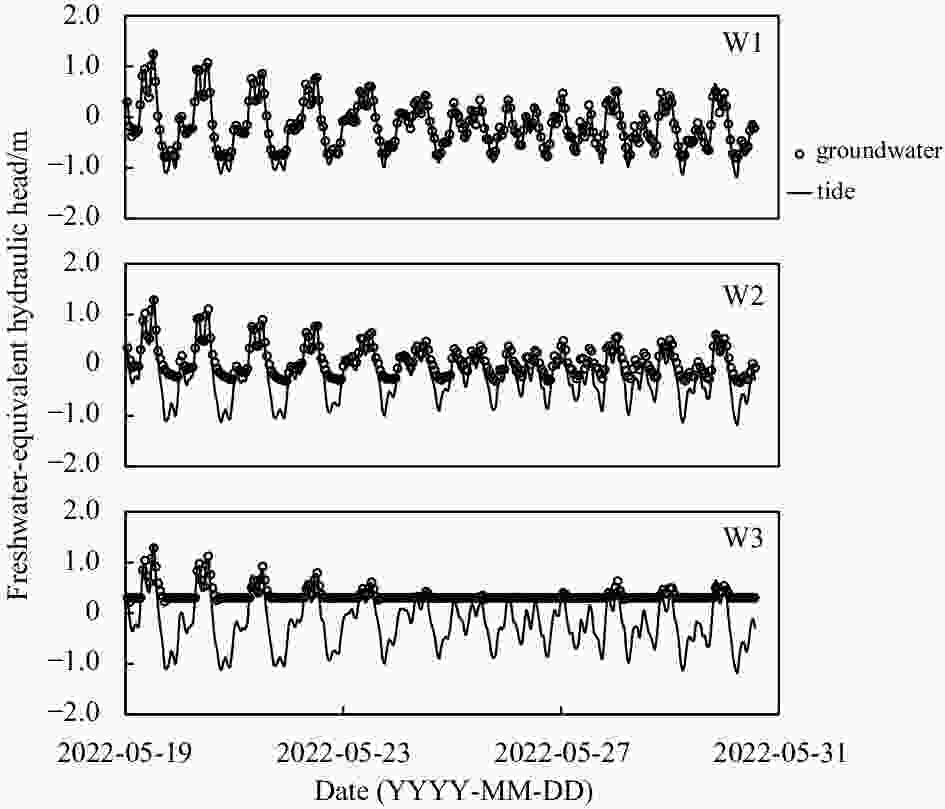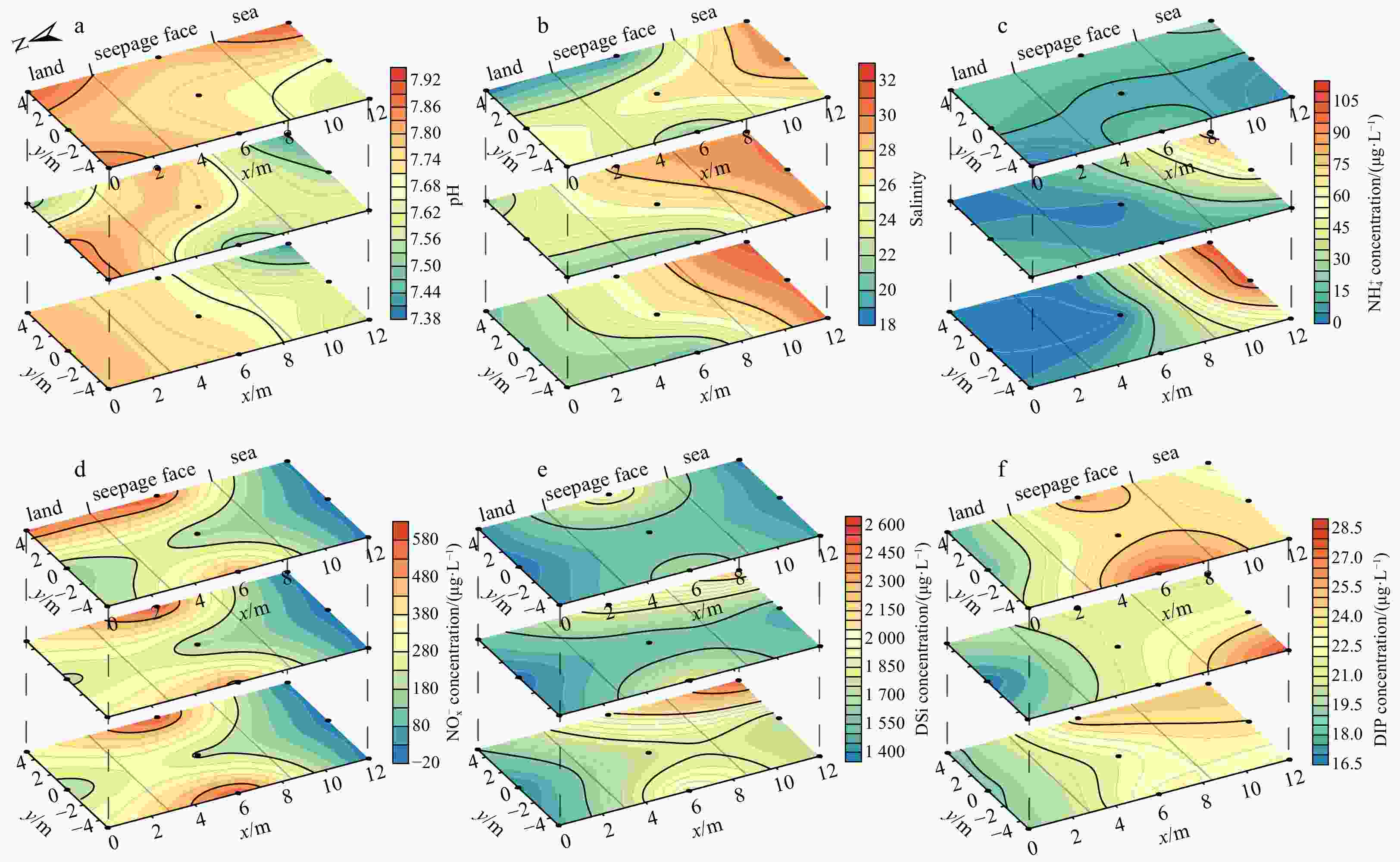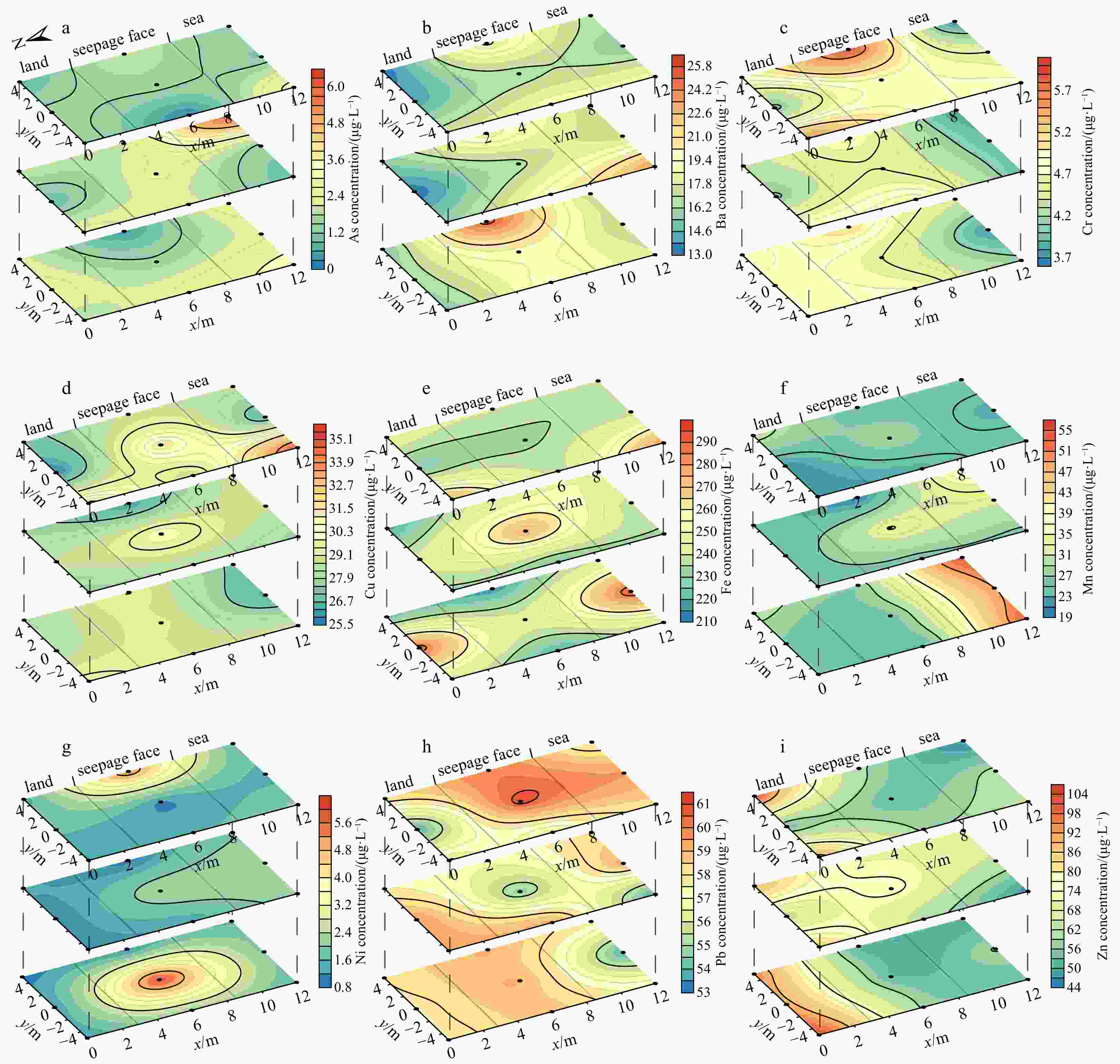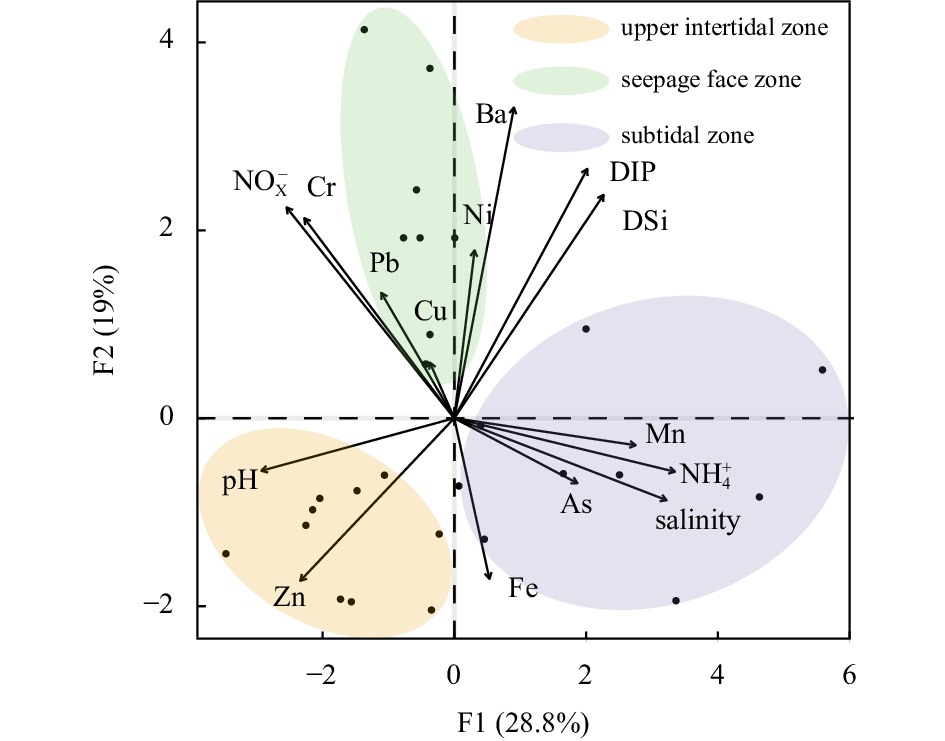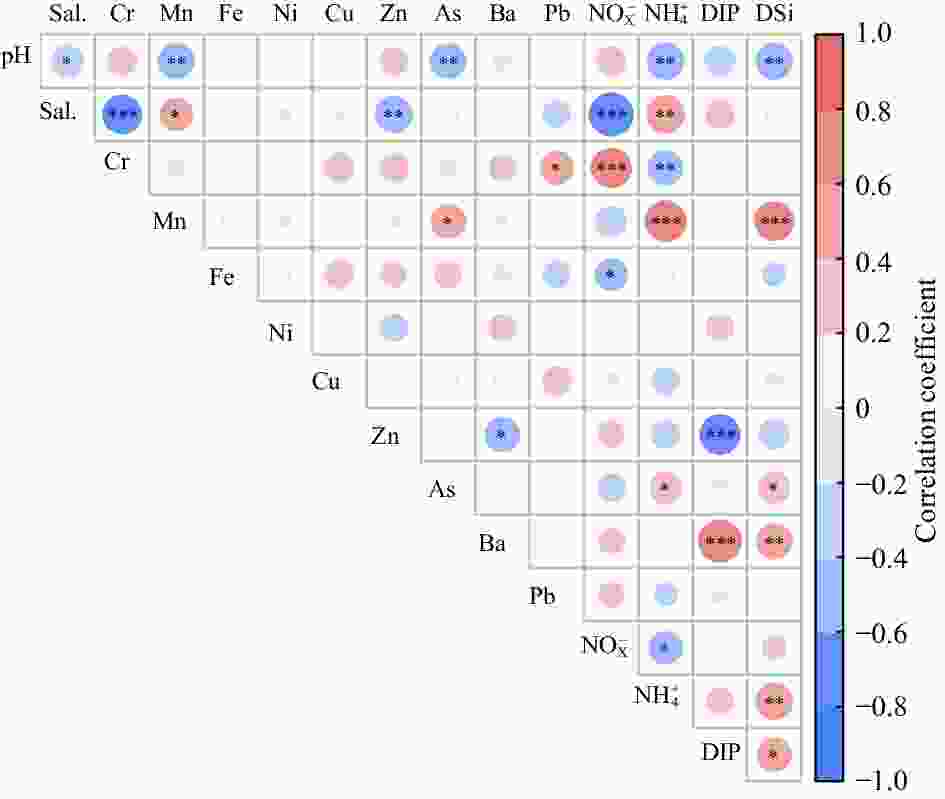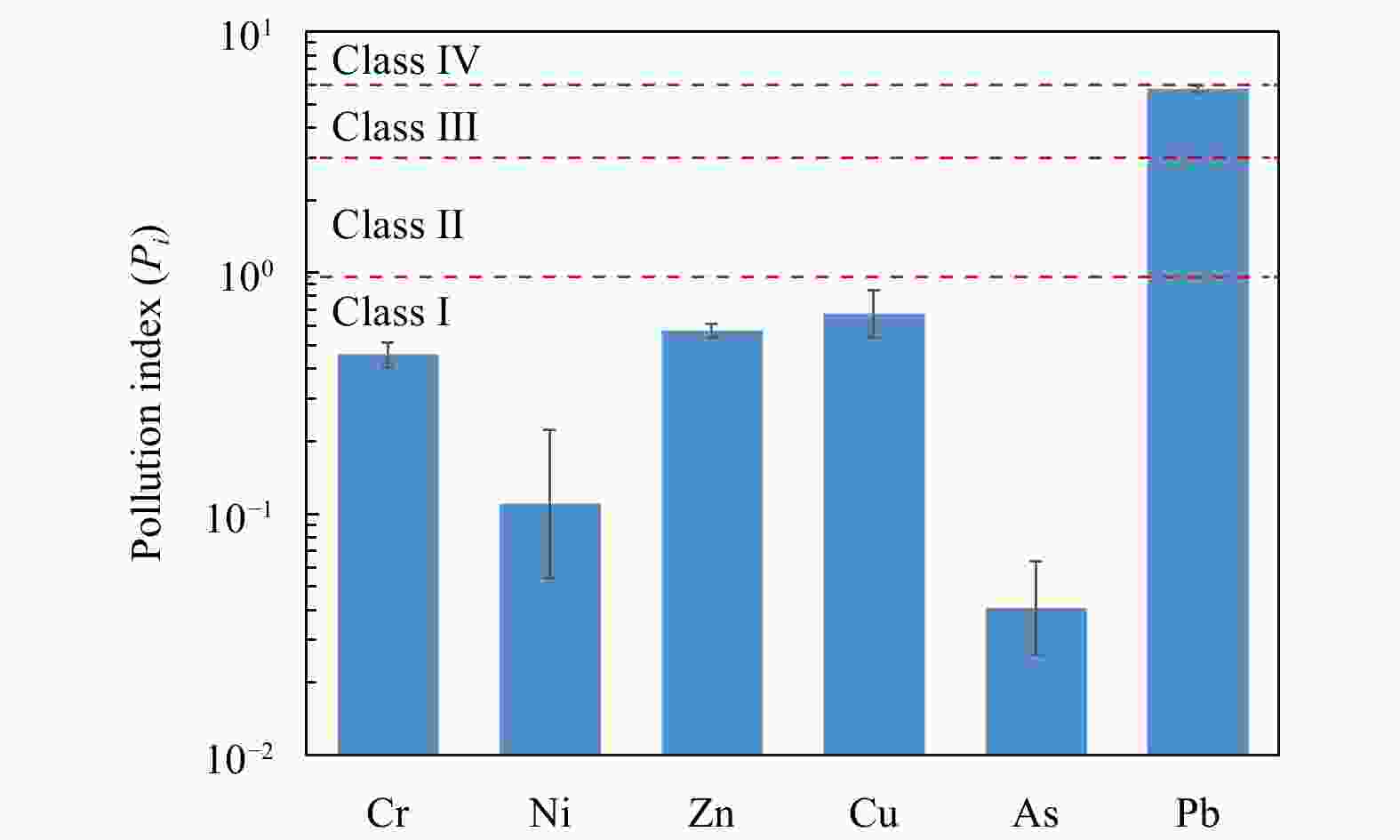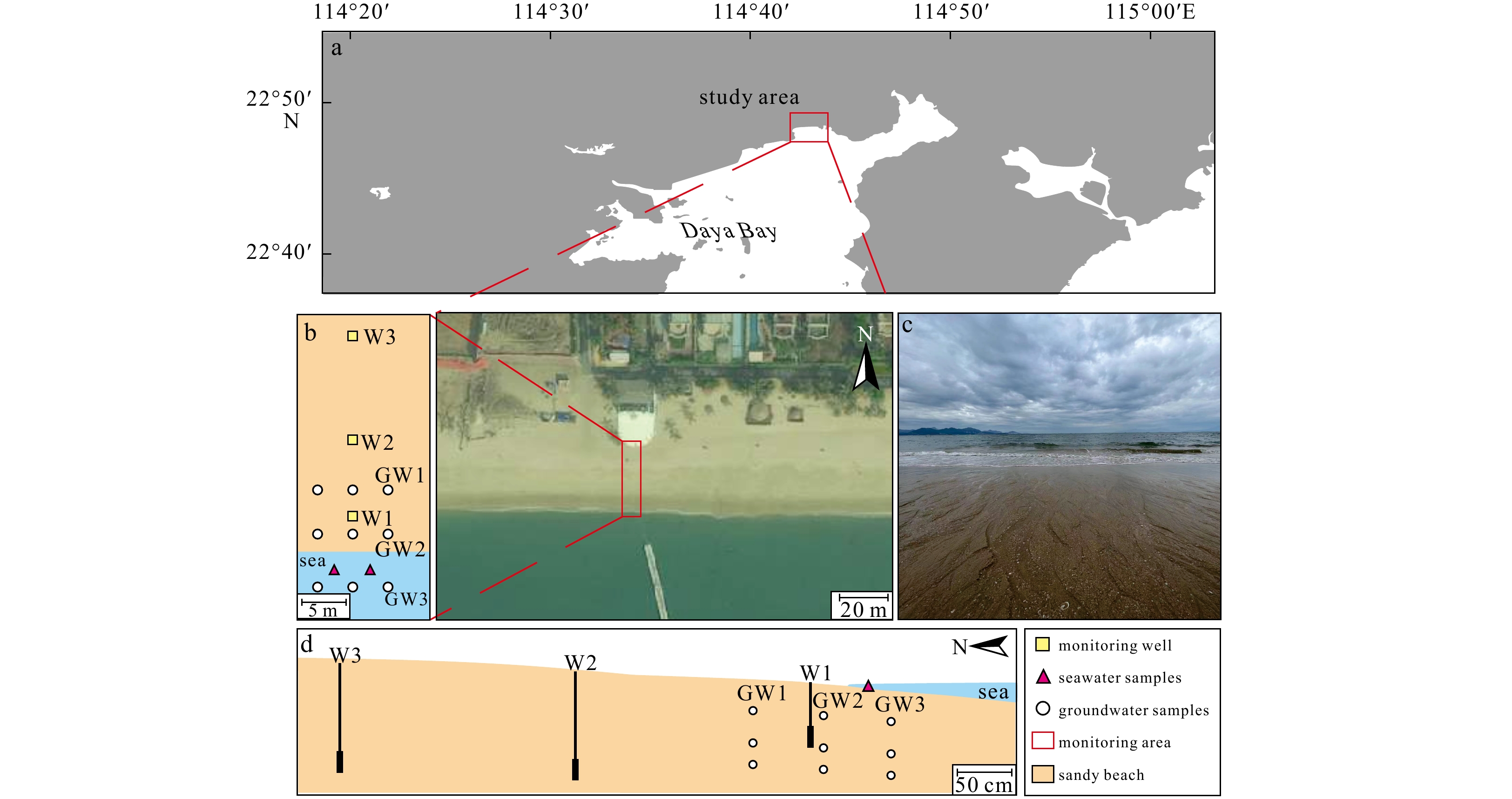Spatial distribution and export of nutrients and metal elements in the subterranean estuary of Daya Bay
-
Abstract: Subterranean estuaries (STE) are important seawater-groundwater mixing zones with complex biogeochemical processes, which play a vital role in the migration and transformation of dissolved materials. In this study, we first investigated the spatial distributions of dissolved inorganic nitrogen (DIN), dissolved inorganic phosphorous (DIP), dissolved inorganic silicon (DSi) and metal elements (As, Ba, Cr, Cu, Fe, Mn, Ni, Pb, and Zn) in STE including upper intertidal, seepage face and subtidal zones. We then estimated submarine groundwater discharge (SGD) and associated nutrient and metal element fluxes. From the generalized Darcy’s law method, SGD was estimated to be 30.13 cm/d, which was about 7 times larger than the inflow (4.16 cm/d). The nutrient and metal fluxes from SGD were estimated to be (5.33 ± 4.99) mmol/(m2·d) for DIN, (0.22 ± 0.03) mmol/(m2·d) for DIP, (16.20 ± 2.05) mmol/(m2·d) for DSi, (1325.06 ± 99.10) μmol/(m2·d) for Fe, (143.41 ± 25.13) μmol/(m2·d) for Mn, (304.06 ± 81.07) μmol/(m2·d) for Zn, (140.21 ± 13.33) μmol/(m2·d) for Cu, (84.49 ± 2.94) μmol/(m2·d) for Pb, (37.38 ± 5.51) μmol/(m2·d) for Ba, (27.88 ± 3.89) μmol/(m2·d) for Cr, (10.10 ± 6.33) μmol/(m2·d) for Ni, and (6.25 ± 3.45) μmol/(m2·d) for As. The nutrient and metal fluxes from SGD were relatively higher than those from the inflow, suggesting that nearshore groundwater acted as the sources of nutrients and metal elements discharging into the sea. The environmental potential pollution of coastal seawater was evaluated by pollution factor index (Pi), comprehensive water quality index (CWQI), and ecological risk index (ERI). Pb mainly caused potential danger of nearshore environment with considerable contamination (Pi = 5.78 ± 0.19), heavy pollution (CWQI = 4.09) and high ecological risk (ERI = 18.00). This study contributed to better understanding the behavior of nutrients and metal elements and improving the sustainable management of STE under the pressure of anthropogenic activities and climate change.
-
Key words:
- subterranean estuaries /
- submarine groundwater discharge /
- nutrients /
- metal elements /
- pollution assessment /
- Daya Bay
-
Figure 1. Location information of the study site: a. Daya Bay; b. sampling area and the spatial distributions of monitoring wells, as well as the groundwater and seawater samplings; c. seepage face zone; d. spatial distributions of monitoring wells (rectangles) including LTC-Diver and sampling points (dots) along the transect from intertidal zone to subtidal zone.
Figure 3. Spatial distributions of physicochemical parameters and nutrients, including pH (a), salinity (b),
$ {\rm{NH}}_4^ + $ (c),${\rm{NO}}_{\rm{x}}^ -\ ({\rm{NO}}_{\rm{x}}^-={\rm{NO}}_{\rm{3}}^ - + $ $ {\rm{NO}}_{\rm{2}}^ - )$ (d), dissolved inorganic silicon (DSi) (e), and dissolved inorganic phosphorous (DIP) (f). The black dots mean the sampling points of groundwater.Table 1. The nutrient fluxes derived by submarine groundwater discharge (SGD) in the Daya Bay in comparison with other studies
Case studies SGD/(cm·d−1) Fluxes of nutrients/(mmol·m−2·d−1) Reference $ {\rm{NO}}_{\rm{x}}^ - $ $ {\rm{NH}}_4^ + $ DIN DIP DSi STE in Daya Bay, China 30.13 5.09 0.24 5.33 0.22 16.20 this study Daya Bay, China 1.18±0.43 ND ND 0.285 0.015 2.66 Wang et al. (2018a) Daya Bay, China 5.3 ND ND 3.62 0.1 ND Gao et al. (2018) Daya Bay, China 28.2–30.9 ND 0.656 ND 0.0012 1.794 Wang et al. (2017) Jiaozhou Bay, China 2.12–5.59 ND ND 4.36 0.04 2.49 Zhang et al. (2020) Sanya Bay, China (4.3±2.1)–(7.8±4.1) ND ND 8.54 0.1 13.85 Wang et al. (2018b) Bohai Bay, China 7.3 ND ND 7.78 0.15 9.26 Wang et al. (2020) Kakinada Bay, India 17.93 ND ND 121.21 9.50 199.00 Rengarajan and Sarma (2015) Masan Bay, Korea 6.1–7.1 ND ND 1.16–6.01 0.028–0.140 0.74–3.84 Lee et al. (2009) Note: STE: subterranean estuaries; ND: no data; DIN: dissolved inorganic nitrogen; DIP: dissolved inorganic phosphorous; DSi: dissolved inorganic silicon. Table 2. The metal fluxes derived by submarine groundwater discharge (SGD) in the Daya Bay in comparison with other studies
Case studies SGD/(cm·d−1) Fluxes of metal elements/(μmol·m−2·d−1) Reference Cr Mn Fe Ni Cu Zn As Ba Pb STE in Daya Bay, China 30.13 27.88 143.41 1325.06 10.10 140.21 304.06 6.25 37.38 84.49 this study Bangdu, Korea 24.38 ND 2.5 270 2.4 0.7 ND ND ND ND Jeong et al. (2012) Jiaozhou Bay, China 0.0036–7.6 11.92 ND ND ND 5.87 3.85 0.13 ND 1.59 Qu et al. (2020) Greater Bay , China 4.57 0.81 ND ND 0.48 0.7 10.46 2.2 ND 0.03 Luo et al. (2022) Hailing Island, China 5–10 1.37 ND 70.88 0.2 0.37 24.94 1.88 10.45 0.082 Li et al. (2022) Bohai Bay 2.00–4.81 1.69–4.63 750.0–1687.5 125–375 ND ND 18.75–51.25 ND ND ND Wang et al. (2019) Note: STE: subterranean estuaries; ND: no data. -
Abou Zakhem B, Hafez R. 2015. Heavy metal pollution index for groundwater quality assessment in Damascus Oasis, Syria. Environmental Earth Sciences, 73(10): 6591–6600. doi: 10.1007/s12665-014-3882-5 Babu D S S, Khandekar A, Bhagat C, et al. 2021. Evaluation, effect and utilization of submarine groundwater discharge for coastal population and ecosystem: a special emphasis on Indian coastline. Journal of Environmental Management, 277: 111362. doi: 10.1016/j.jenvman.2020.111362 Burnett W C, Aggarwal P K, Aureli A, et al. 2006. Quantifying submarine groundwater discharge in the coastal zone via multiple methods. Science of the Total Environment, 367(2–3): 498–543 Burnett W C, Bokuniewicz H, Huettel M, et al. 2003. Groundwater and pore water inputs to the coastal zone. Biogeochemistry, 66(1–2): 3–33 Cao Feifei, Kong Linghao, Yang Liyuan, et al. 2015. Geochemical fractions and risk assessment of trace elements in soils around Jiaojia gold mine in Shandong Province, China. Environmental Science and Pollution Research, 22(17): 13496–13505. doi: 10.1007/s11356-015-4618-0 Chen Guangquan, Xu Bochao, Zhao Shibin, et al. 2022. Submarine groundwater discharge and benthic biogeochemical zonation in the Huanghe River Estuary. Acta Oceanologica Sinica, 41(1): 11–20. doi: 10.1007/s13131-021-1882-3 Chen Xiaogang, Du Jinzhou, Yu Xueqing, et al. 2021. Porewater-derived dissolved inorganic carbon and nutrient fluxes in a saltmarsh of the Changjiang River Estuary. Acta Oceanologica Sinica, 40(8): 32–43. doi: 10.1007/s13131-021-1797-z Dun Yu, Ling Junhong, Wang Rui, et al. 2022. Hydrochemical evolution and nitrogen behaviors in coastal groundwater suffered from seawater intrusion and anthropogenic inputs. Frontiers in Marine Science, 9: 945330. doi: 10.3389/fmars.2022.945330 Gao Jingyan, Wang Xuejing, Zhang Yan, et al. 2018. Estimating submarine groundwater discharge and associated nutrient inputs into Daya Bay during spring using radium isotopes. Water Science and Engineering, 11(2): 120–130. doi: 10.1016/j.wse.2018.06.002 Garcia-Orellana J, Cochran J K, Bokuniewicz H, et al. 2014. Evaluation of 224Ra as a tracer for submarine groundwater discharge in Long Island Sound (NY). Geochimica et Cosmochimica Acta, 141: 314–330. doi: 10.1016/j.gca.2014.05.009 Garcia-Solsona E, Garcia-Orellana J, Masqué P, et al. 2010. An assessment of karstic submarine groundwater and associated nutrient discharge to a Mediterranean coastal area (Balearic Islands, Spain) using radium isotopes. Biogeochemistry, 97(2): 211–229 Guo Xueru, Zuo Rui, Meng Li, et al. 2018. Seasonal and spatial variability of anthropogenic and natural factors influencing groundwater quality based on source apportionment. International Journal of Environmental Research and Public Health, 15(2): 279. doi: 10.3390/ijerph15020279 Hakanson L. 1980. An ecological risk index for aquatic pollution control. A sedimentological approach. Water Research, 14(8): 975–1001. doi: 10.1016/0043-1354(80)90143-8 Ho Peng, Shim M J, Howden S D, et al. 2019. Temporal and spatial distributions of nutrients and trace elements (Ba, Cs, Cr, Fe, Mn, Mo, U, V and Re) in Mississippi coastal waters: influence of hypoxia, submarine groundwater discharge, and episodic events. Continental Shelf Research, 175: 53–69. doi: 10.1016/j.csr.2019.01.013 Hu Bangqi, Li Guogang, Li Jun, et al. 2013. Spatial distribution and ecotoxicological risk assessment of heavy metals in surface sediments of the southern Bohai Bay, China. Environmental Science and Pollution Research, 20(6): 4099–4110. doi: 10.1007/s11356-012-1332-z Jeong J, Kim G, Han S. 2012. Influence of trace element fluxes from submarine groundwater discharge (SGD) on their inventories in coastal waters off volcanic island, Jeju, Korea. Applied Geochemistry, 27(1): 37–43. doi: 10.1016/j.apgeochem.2011.08.014 Jiang Shan, Zhang Yixue, Jin Jie, et al. 2020. Organic carbon in a seepage face of a subterranean estuary: turnover and microbial interrelations. Science of the Total Environment, 725: 138220. doi: 10.1016/j.scitotenv.2020.138220 Kim I, Kim G. 2015. Role of colloids in the discharge of trace elements and rare earth elements from coastal groundwater to the ocean. Marine Chemistry, 176: 126–132. doi: 10.1016/j.marchem.2015.08.009 Lee Y W, Hwang D W, Kim G, et al. 2009. Nutrient inputs from submarine groundwater discharge (SGD) in Masan Bay, an embayment surrounded by heavily industrialized cities, Korea. Science of the Total Environment, 407(9): 3181–3188. doi: 10.1016/j.scitotenv.2008.04.013 Li L, Barry D A, Stagnitti F, et al. 1999. Submarine groundwater discharge and associated chemical input to a coastal sea. Water Resources Research, 35(11): 3253–3259. doi: 10.1029/1999WR900189 Li Hailong, Boufadel M C, Weaver J W. 2008. Tide-induced seawater–groundwater circulation in shallow beach aquifers. Journal of Hydrology, 352(1–2): 211–224 Li Gang, Li Hailong, Wang Xuejing, et al. 2018. Groundwater-surface water exchanges and associated nutrient fluxes in Dan’ao Estuary, Daya Bay, China. Continental Shelf Research, 166: 83–91. doi: 10.1016/j.csr.2018.06.014 Li Zhenyang, Pan Feng, Xiao Kai, et al. 2022. An integrated study of the spatiotemporal character, pollution assessment, and migration mechanism of heavy metals in the groundwater of a subtropical mangrove wetland. Journal of Hydrology, 612: 128251. doi: 10.1016/j.jhydrol.2022.128251 Li Hailong, Sun Pingping, Chen Shi, et al. 2010. A falling-head method for measuring intertidal sediment hydraulic conductivity. Groundwater, 48(2): 206–211. doi: 10.1111/j.1745-6584.2009.00638.x Liu Yi, Jiao Jiujimmy, Cheng Hokwan. 2018a. Tracing submarine groundwater discharge flux in Tolo Harbor, Hong Kong (China). Hydrogeology Journal, 26(6): 1857–1873. doi: 10.1007/s10040-018-1736-z Liu Yi, Liang Wenzhao, Jiao Jiujimmy. 2018b. Seasonality of nutrient flux and biogeochemistry in an intertidal aquifer. Journal of Geophysical Research: Oceans, 123(9): 6116–6135. doi: 10.1029/2018JC014197 Luo Manhua, Zhang Yan, Li Hailong, et al. 2022. Pollution assessment and sources of dissolved heavy metals in coastal water of a highly urbanized coastal area: the role of groundwater discharge. Science of the Total Environment, 807: 151070. doi: 10.1016/j.scitotenv.2021.151070 Ma Qian, Li Hailong, Wang Xuejing, et al. 2015. Estimation of seawater–groundwater exchange rate: case study in a tidal flat with a large-scale seepage face (Laizhou Bay, China). Hydrogeology Journal, 23(2): 265–275. doi: 10.1007/s10040-014-1196-z Mayfield K K, Eisenhauer A, Santiago Ramos D P, et al. 2021. Groundwater discharge impacts marine isotope budgets of Li, Mg, Ca, Sr, and Ba. Nature Communication, 12(1): 148. doi: 10.1038/s41467-020-20248-3 Millward G E, Liu Y P. 2003. Modelling metal desorption kinetics in estuaries. Science of the Total Environment, 314–316: 613–623 Montluçon D, Sañudo-Wilhelmy S A. 2001. Influence of net groundwater discharge on the chemical composition of a coastal environment: Flanders Bay, Long Island, New York. Environmental Science & Technology, 35(3): 480–486 Moore W S. 1999. The subterranean estuary: a reaction zone of ground water and sea water. Marine Chemistry, 65(1–2): 111–125 Moore W S. 2003. Sources and fluxes of submarine groundwater discharge delineated by radium isotopes. Biogeochemistry, 66(1–2): 75–93 Price R M, Swart P K, Fourqurean J W. 2006. Coastal groundwater discharge—an additional source of phosphorus for the oligotrophic wetlands of the Everglades. Hydrobiologia, 569(1): 23–36. doi: 10.1007/s10750-006-0120-5 Qu Wenjing, Li Hailong, Huang Hao, et al. 2017. Seawater-groundwater exchange and nutrients carried by submarine groundwater discharge in different types of wetlands at Jiaozhou Bay, China. Journal of Hydrology, 555: 185–197. doi: 10.1016/j.jhydrol.2017.10.014 Qu Shuyi, Wu Weihua, Nel W, et al. 2020. The behavior of metals/metalloids during natural weathering: a systematic study of the mono-lithological watersheds in the upper Pearl River Basin, China. Science of the Total Environment, 708: 134572. doi: 10.1016/j.scitotenv.2019.134572 Rengarajan R, Sarma V V S S. 2015. Submarine groundwater discharge and nutrient addition to the coastal zone of the Godavari Estuary. Marine Chemistry, 172: 57–69. doi: 10.1016/j.marchem.2015.03.008 Rodellas V, Garcia-Orellana J, Tovar-Sánchez A, et al. 2014. Submarine groundwater discharge as a source of nutrients and trace metals in a Mediterranean bay (Palma Beach, Balearic Islands). Marine Chemistry, 160: 56–66. doi: 10.1016/j.marchem.2014.01.007 Sanders C J, Santos I R, Barcellos R, et al. 2012. Elevated concentrations of dissolved Ba, Fe and Mn in a mangrove subterranean estuary: consequence of sea level rise?. Continental Shelf Research, 43: 86–94. doi: 10.1016/j.csr.2012.04.015 Santos I R S, Burnett W C, Chanton J, et al. 2008. Nutrient biogeochemistry in a Gulf of Mexico subterranean estuary and groundwater-derived fluxes to the coastal ocean. Limnology and Oceanography, 53(2): 705–718. doi: 10.4319/lo.2008.53.2.0705 Santos I R, Burnett W C, Dittmar T, et al. 2009. Tidal pumping drives nutrient and dissolved organic matter dynamics in a Gulf of Mexico subterranean estuary. Geochimica et Cosmochimica Acta, 73(5): 1325–1339. doi: 10.1016/j.gca.2008.11.029 Shum K T, Sundby B. 1996. Organic matter processing in continental shelf sediments—the subtidal pump revisited. Marine Chemistry, 53(1–2): 81–87 Sun Xia, Li Baoshi, Liu Xuanli, et al. 2020. Spatial variations and potential risks of heavy metals in seawater, sediments, and living organisms in Jiuzhen Bay, China. Journal of Chemistry, 2020: 7971294 Sun Zhigao, Mou Xiaojie, Tong Chuan, et al. 2015. Spatial variations and bioaccumulation of heavy metals in intertidal zone of the Yellow River Estuary, China. CATENA, 126: 43–52. doi: 10.1016/j.catena.2014.10.037 Syvitski J P M, Vörösmarty C J, Kettner A J, et al. 2005. Impact of humans on the flux of terrestrial sediment to the global coastal ocean. Science, 308(5720): 376–380. doi: 10.1126/science.1109454 Wang Xuejing, Li Hailong, Yang Jinzhong, et al. 2017. Nutrient inputs through submarine groundwater discharge in an embayment: a radon investigation in Daya Bay, China. Journal of Hydrology, 551: 784–792. doi: 10.1016/j.jhydrol.2017.02.036 Wang Qianqian, Li Hailong, Zhang Yan, et al. 2019. Evaluations of submarine groundwater discharge and associated heavy metal fluxes in Bohai Bay, China. Science of the Total Environment, 695: 133873. doi: 10.1016/j.scitotenv.2019.133873 Wang Qianqian, Li Hailong, Zhang Yan, et al. 2020. Submarine groundwater discharge and its implication for nutrient budgets in the western Bohai Bay, China. Journal of Environmental Radioactivity, 212: 106132. doi: 10.1016/j.jenvrad.2019.106132 Wang Xuejing, Li Hailong, Zheng Chunmiao, et al. 2018a. Submarine groundwater discharge as an important nutrient source influencing nutrient structure in coastal water of Daya Bay, China. Geochimica et Cosmochimica Acta, 225: 52–65. doi: 10.1016/j.gca.2018.01.029 Wang Xilong, Su Kaijun, Du Juan, et al. 2021a. Estimating submarine groundwater discharge at a subtropical river estuary along the Beibu Gulf, China. Acta Oceanologica Sinica, 40(9): 13–22. doi: 10.1007/s13131-021-1862-7 Wang Guizhi, Wang Shuling, Wang Zhangyong, et al. 2018b. Significance of submarine groundwater discharge in nutrient budgets in tropical Sanya Bay, China. Sustainability, 10(2): 380. doi: 10.3390/su10020380 Wang Qianqian, Wang Xuejing, Xiao Kai, et al. 2021b. Submarine groundwater discharge and associated nutrient fluxes in the Greater Bay Area, China revealed by radium and stable isotopes. Geoscience Frontiers, 12(5): 101223. doi: 10.1016/j.gsf.2021.101223 Wang Hua, Zhou Yiyi, Wang Xiao. 2016. Transport dynamics of Cr and Zn between deposited sediment and overlying water. CLEAN-Soil, Air, Water, 44(11): 1453–1460 Wen Xiaohu, Lu Jian, Wu Jun, et al. 2019. Influence of coastal groundwater salinization on the distribution and risks of heavy metals. Science of the Total Environment, 652: 267–277. doi: 10.1016/j.scitotenv.2018.10.250 Xiao Kai, Wu Jiapeng, Li Hailong, et al. 2018. Nitrogen fate in a subtropical mangrove swamp: potential association with seawater-groundwater exchange. Science of the Total Environment, 635: 586–597. doi: 10.1016/j.scitotenv.2018.04.143 Xu Bochao, Cardenas M B, Santos I R, et al. 2022. Closing the global Marine 226Ra budget reveals the biological pump as a dominant removal flux in the upper ocean. Geophysical Research Letters, 49(12): e2022GL098087 Yin Xianqiang, Gao Bin, Ma L Q, et al. 2010. Colloid-facilitated Pb transport in two shooting-range soils in Florida. Journal of Hazardous Materials, 177(1–3): 620–625 Zhang Yan, Santos I R, Li Hailong, et al. 2020. Submarine groundwater discharge drives coastal water quality and nutrient budgets at small and large scales. Geochimica et Cosmochimica Acta, 290: 201–215. doi: 10.1016/j.gca.2020.08.026 Zhong Qiangqiang, Li Linwei, Puigcorbé V, et al. 2022. Contrasting behaviors of 210Po, 210Pb and 234Th in the East China Sea during a severe red tide: enhanced scavenging and promoted fractionation. Acta Oceanologica Sinica, 41(8): 5–21. doi: 10.1007/s13131-021-1958-0 -




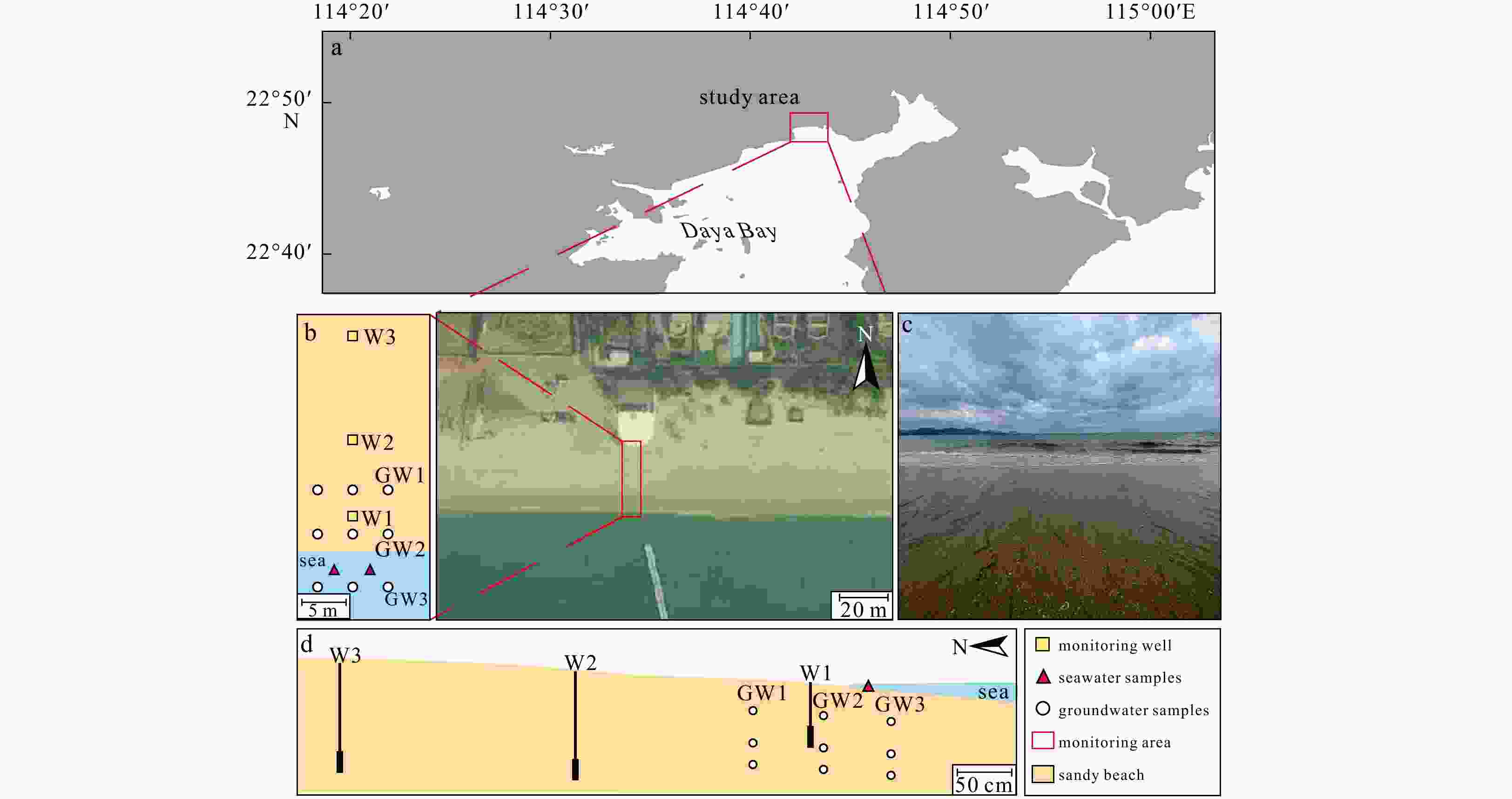
 下载:
下载:
